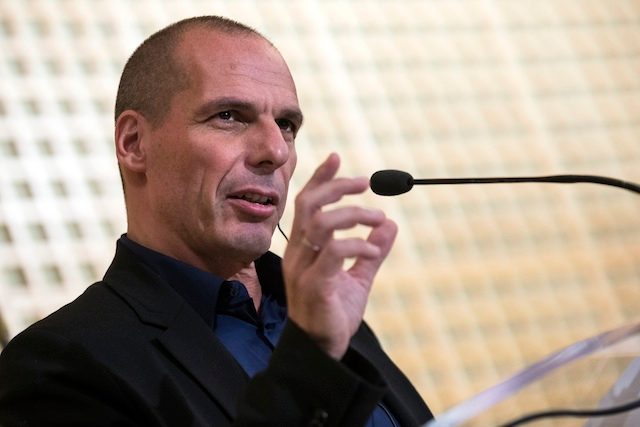SUMMARY
This is AI generated summarization, which may have errors. For context, always refer to the full article.

PARIS, France – Greek Finance Minister Yanis Varoufakis said Sunday, February 1, he wanted to reach a new debt deal with creditors within months to end his country’s loan “addiction”, as he embarked on a European tour to build support for a renegotiation of Greece’s 240 billion-euro bailout.
Kicking off his diplomatic charm offensive in Paris, Varoufakis also said Greece did not want the next promised loan tranche of 7.2 billion euros ($8 billion) in funds from the European Union, International Monetary Fund and European Central Bank (ECB).
“It’s not that we don’t need the money; we’re desperate,” he said at a joint press conference with his French counterpart Michel Sapin. “What this government is all about is ending this addiction.”
With a newly elected anti-austerity government in charge, he said Greece would have to go “cold turkey” and stop living for the next loan tranche.
Setting out a timetable for a revised debt agreement, which has met with strong German opposition, Varoufakis said if Athens had until the end of the month to come up with detailed proposals, it envisaged reaching an agreement with international partners some 6 weeks later.
Looking farther ahead, he added: “It will be very sensible to have a new contract for Greece and all nations in place by the end of May.”
Varoufakis’ plea for time to come up with a realistic solution will be seen as another olive branch to Europe after Prime Minister Alexis Tsipras earlier tried to calm nerves and spooked markets by saying he did not intend to renege on commitments to the EU and IMF.
“It has never been our intention to act unilaterally on Greek debt,” Tsipras said in a statement to Bloomberg News.
But he said Greece needed greater leeway to tackle root problems in its economy, such as tax evasion, corruption and policies that favor only a wealthy few.
“We need time to breathe and create our own medium-term recovery program,” he said.
Greece’s flurry of diplomacy has seen Tsipras phone European Central Bank chief Mario Draghi late Saturday, January 31, and book meetings with Italian Prime Minister Matteo Renzi, French President Francois Hollande and European Commission President Jean-Claude Juncker this week.
Varoufakis meanwhile will meet his British and Italian counterparts in London on Monday, February 2, and Rome on Tuesday, February 3.
Varoufakis told reporters in Paris that he also wanted to visit Germany, which has shouldered the bulk of Greece’s loans and which strongly objects to Athens’ plans.
“It is essential that we meet,” Varoufakis said, referring to German Finance Minister Wolfgang Schaeuble. “Germany is the powerhouse of Europe.”
But the German finance ministry said it had not yet received an “official request” from Greece for such a visit.
Merkel holds firm
German Chancellor Angela Merkel on Saturday ruled out fresh debt relief, telling the Hamburger Abendblatt daily: “There has already been voluntary debt forgiveness by private creditors, banks have already slashed billions from Greece’s debt.”
“I do not envisage fresh debt cancellation,” she said. Portugal and Finland also oppose debt relief.
Despite a restructuring in 2012, Greece is still lumbered with debts of more than 315 billion euros, upwards of 175% of gross domestic product (GDP) – an EU record.
But in its first week in power, the government scrapped the privatization of Greece’s two main ports and the state power company and announced a major increase in the minimum wage.
A renowned left-wing blogger, Varoufakis has argued that the bailout merely throws good money after bad – piling more debt on Greece to pay off old borrowing, rather than fixing the economy.
“We are calling (the bailout) into question not just because it is not good for Greece, but we consider that it is very bad for all of Europe,” he has said.
Varoufakis received a sympathetic hearing in Paris, where Sapin said France stood ready to “always be there to find a way, a solution that allows everyone to overcome their difficulties”.
Sapin had already said the EU should be open to reworking Greece’s bailout program, while emphasizing that it must still pay up eventually.
The stunning success of Tsipras’ hard-left Syriza party in last Sunday’s polls sent shockwaves through the continent and has encouraged other anti-austerity parties.
At least 100,000 people took to the streets of Madrid on Saturday in support of the Spanish party Podemos, which has surged in polls ahead of elections late this year. – With Alice Ritchie in Athens, Greece, Agence France-Presse/Rappler.com
Add a comment
How does this make you feel?
There are no comments yet. Add your comment to start the conversation.